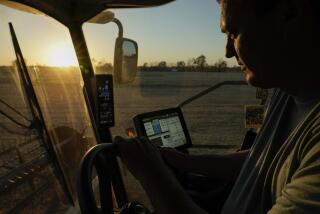A Bitter Harvest: Iowa Farmer Calls It Quits
- Share via
ATLANTIC, Iowa — As the copper glow of the fall sunset fades, Roger Warne’s tractor chugs along the dusty gravel road, hauling in a load of beans. It is a routine chore, but this year it carries more weight--the heavy weight of family history.
This is his last harvest.
This too is the end of a Warne family tradition that lasted 131 years, from horse-and-plow to computer-in-the-combine, through five generations of fathers handing down to their sons a love of the land as if it were a treasured heirloom.
With his 40th birthday weeks away, Warne decided it was time to make a break, to revive his teaching career, to have a steady paycheck, not one measured by nature’s whims, the strength of Asia’s economy or government bailouts.
“I just couldn’t handle another year of going backward,” Warne says, resting on his paint-chipped swing, his Chesapeake Bay retriever, Sadie, nuzzling his ankles. “I needed to start digging myself out.”
Facing debts of more than $100,000, Warne told his father last spring that after 15 years of farming, he was about to call it quits.
“I’m sorry I failed,” he said, his voice quavering as he repaired a disc in his father’s shed, preparing for his final planting season.
“No, you didn’t,” Ross Warne reassured him with the calm of a 73-year-old who has weathered his own hard times during 60 years of farming the same softly rolling hills.
“I don’t see how anyone can make it work these days,” the elder Warne later says, shaking his head in dismay.
Warne’s predicament is far from unusual.
Even with a booming national economy, a record $8.7-billion federal bailout and bumper harvests expected across much of the heartland, thousands of farmers in the Midwest and Plains are in trouble, and many may not be back in the fields next spring.
Many experts say the problem is basic economics: too much supply, too little demand.
Increased global competition, along with Asian and Russian economic troubles that dampened demand for U.S. grain, have pushed down prices dramatically. In some places, years of bad weather and disease added to the misery.
Some also blame a 1996 law commonly known as Freedom to Farm, which gave farmers more flexibility in planting crops, stopped paying for long-term grain storage and eliminated the idle land requirement, which was done in exchange for subsidies.
Corn prices are at their lowest since the farm crisis of the mid-1980s; for soybeans, it’s the early 1970s--and that’s without adjusting for inflation, says Robert Wisner, an economics professor at Iowa State University.
In 1995-96, a peak time for prices, Warne could get $3.24 for a bushel of corn; he recently sold his for $1.46, about $1 below the break-even cost. Government assistance closes some of the gap, but not enough.
As many as 40% of Iowa farmers are considered vulnerable and must make major changes to survive, according to a study by Robert Jolly, an agricultural economist at Iowa State.
“We’ve had people on the edge all along,” he says. “You put a couple of bad years together, and the financial stress becomes more evident. If you have a divorce, a death in the family and your car is smashed up, you reach a point where you’ve just about had it. That’s what’s happening now to farmers.”
And that’s what happened to Roger Warne.
Warne was a natural at farming, driving his dad’s tractor at age 10, hauling corn by 12. He attended Iowa State University, where the sturdy 6-foot-2 student played football and earned a teaching degree. But after two years in the classroom, he realized his dreams were in the fields.
He returned to this western Iowa community, settled in the blue-frame home where his father slept as a boy and plowed the same rich black earth his ancestors had through two world wars, a Depression and countless recessions.
Warne had always mastered whatever he tried. He was an all-around athlete in high school: He made the Atlantic Trojans’ baseball, football, basketball and track teams. He showed a champion steer at the county fair. He sculpts his own oak furniture.
For a time, farming too meant success.
He farmed 420 acres and, after several years, he expanded and poured nearly $200,000 into setting up a pig co-op with two partners.
When it collapsed after hog prices plummeted, Warne pushed on.
He had always considered farming as something of a gamble, so he held out for the jackpot, the one great year that would wipe out all the bad ones. It never came.
Last year Warne spent $100,000 planting his crop, only to earn as much money as he would have flipping burgers in a fast-food joint.
His nerves frayed, his mind wandered.
“There have been days,” he confides, “when you have all sorts of crazy thoughts, when you think that you’re worth more dead than you are alive. . . . You have life insurance policies to ensure that what’s left behind is going to be able to take care of everything. . . . But hopefully I’m a reasonable individual.”
Warne now worries it may take 20 years to erase his debt, so he still keeps farmer’s hours: He teaches at Atlantic High School, coaches and referees basketball and leads an adult education class one night a week. He also keeps his hand in the hog business.
His wife, Nita--both are in their second marriages and together they have five children--makes sandwiches at a local Subway shop. She welcomed his career change, having noticed how agitated her easygoing husband had become.
“I said, ‘It’s time,’ ” she recalls. “Let’s get on our feet. Let’s try to start something for our future.”
Warne will miss much about farming: being his own boss, endless green horizons, the joy of nurturing golden stalks of corn until they sprout as high as those 10-foot-high basketball rims he still reaches for during pickup games.
On a recent warm fall day, Warne, assisted by his father, hustled to get the last corn from the field. Only about 100 yards remained when the skies crackled with lightning and thunder boomed.
Nature, not always so obliging, delayed the storm this time. Warne finished his last harvest and drove home.
Then the rains came.
More to Read
Sign up for Essential California
The most important California stories and recommendations in your inbox every morning.
You may occasionally receive promotional content from the Los Angeles Times.













